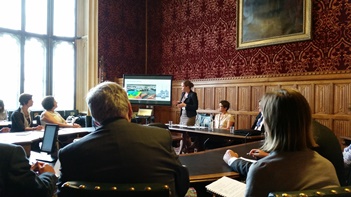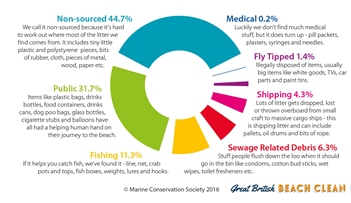09.06.2016
Litter choking marine environment, MPs told
 Marine environmental experts have warned a cross-party group of MPs and Peers that the impact of marine litter needs to be addressed.
Marine environmental experts have warned a cross-party group of MPs and Peers that the impact of marine litter needs to be addressed.
The All Party Parliamentary Maritime and Ports Group were told of the increasing danger to marine life and cost to people, with marine litter found on beaches doubling in the last five years.
The issue of litter in UK’s capital river took centre stage with the Port of London Authority (PLA) noting that 300 tonnes of ‘driftwood’ is removed from the Thames every year, much of which is made up of plastic materials like single use plastic bottles.
PLA environment manager Tanya Ferry said:
“We collect the equivalent weight of twenty-four thousand discarded water bottles. But it is just the tip of the iceberg, as we can only remove litter off the foreshore and floating into our driftwood collectors. The sheer volume of rubbish is frightening and has an impact on the port and marine environment, which is home to birds, fish, seals and the UK’s busiest waterway, with tens of thousands of jobs dependant on it.”
Findings in a Thames study by Royal Holloway University of London and the Natural History Museum underlines the concern. They found that 75% of the flatfish species, flounder, from sites in the tidal Thames have plastic in their bellies.
Dr Dave Morritt, Reader in Aquatic Ecology, Royal Holloway University of London told MPs:
“Our studies have shown that there are considerable amounts of plastic rubbish moving along the river bottom in the Thames. This may lead to fragmentation into smaller pieces which means that plastic is more likely to be ingested by fish species. Thus bottom-feeding fish, such as flounder, may be particularly affected. Indeed we now have preliminary evidence that at certain sites 75% of flounder have plastic fibres and other fragments in their guts. Our studies are continuing on a wider range of species”.
He added “there may be implications for the food chain if chemicals from plastics leach into fish tissues and then are then accumulated in other fish and birds feeding on them”
 Chairing the Parliamentary Group, Jim Fitzpatrick MP for Poplar and Limehouse said:
Chairing the Parliamentary Group, Jim Fitzpatrick MP for Poplar and Limehouse said:
“The Thames runs through my constituency, so it is very worrying to hear of the impact of litter on my local marine environment.
“This issue should be addressed head on, by tackling the causes of litter entering the marine environment. Given the source of litter, we need to encourage behavioural change, to get people to be more responsible in the disposal of their waste”
Dr Sue Kinsey senior pollution policy officer at the Marine Conservation Society told MPs that of the identifiable sources of marine litter collected during the 2015 MCS Great British Beach Clean, 31% came from the public, 11% from the fishing industry, 6% from toilet flushed sewage and 4% from the shipping industry.
She said: “The cost of not addressing the cause is high. In addition to the impact on marine life, there is also a cost to clean up, with the burden often falling on the tax payer or volunteers. There is also a cost to the tourism industry with people less likely to visit dirty beaches and a cost to the fishing industry due to contaminated catches and damaged fishing gear.”
The PLA, Royal Holloway University of London, Natural History Museum and the Marine Conservation Society are backing the Cleaner Thames Campaign, which is calling on people to do the right thing and make sure their rubbish goes in the bin, not in the River Thames.
Press Contact:
Tom Conroy, PLA Communications Manager Telephone: 01474 562246 or Email: [email protected]
About the Cleaner Thames Campaign
- The Cleaner Thames campaign is a aimed at stopping the tide of rubbish that is ending up in the Thames.
- The campaign is facilitated by the Port of London Authority, Tideway, and Thames 21 and has a number of supporters who can be found on the campaign website: http://www.pla.co.uk/cleaner-thames-about
- For more information or to see the campaign videos visit: www.pla.co.uk/CleanerThames
- The Campaign team can be reached at [email protected]

